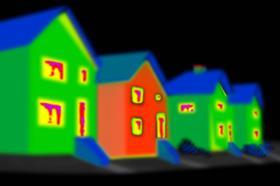Energiesprong UK set to launch £200m framework for UK energy efficiency work across 5,000 homes

A £200m framework for UK energy efficiency work will be launched this summer by the providers of the Dutch version of the Green Deal, Building can reveal.
Energiesprong UK - the UK arm of the Netherlands’ Energiesprong scheme, translated as ‘energy leap’ - will procure contractors to deliver retrofits across 5,000 UK homes at an average price of £40,000 per unit.
The government-supported Dutch scheme works similarly to the UK’s failed Green Deal and involves wrapping an existing building in a prefabricated system of wall and roof panels to increase its energy efficiency.
Energiesprong has been more successful in the Netherlands compared to Green Deal in the UK because retrofits are often done on a larger scale, with Dutch housing associations and contractors entering into agreements to retrofit homes on a street-by-street basis.
Peter Bonfield’s government-commissioned review of UK energy efficiency policy is considering recommending a system similar to Energiesprong for the UK, as revealed by Building last autumn.
Speaking to Building, Energiesprong UK project director Arno Schmickler said the organisation will start engaging with the industry in the next few months before aiming to have deals in place to retrofit 5,000 homes.
He said: “We want to have a concept deal in place for 5,000 units in summer this year. We will enter competitive dialogue with the industry and then we’ll proceed to a procurement framework.”
Schmickler said the organisation will “start with the social housing market”, but added that the “biggest opportunity is in PRS [private rental sector].”
He also said construction partners who helped found Energiesprong UK in July last year will not be guaranteed places on the framework.
The UK organisation currently has 17 partners who created the organisation, including eight housing associations - Accord, Affinity Sutton, Amicus Horizon, Moat, Nottingham City Homes, Orbit, Thrive Homes and Your Homes Newcastle.
Five construction firms are also on board, comprising Mears, Wates, Willmott Dixon and SME contractor Sustainable Group, as well as architect Beattie Passive, along with trade bodies Energy Saving Trust, National Housing Federation and National Energy Foundation.
Schmickler said the first homes to be retrofitted under the scheme will be stock held by partnering housing associations, with homes in Essex, Brighton, Devon, Newcastle and part of the Midlands already identified as “demonstration examples”.
He also revealed there has been interest in Scotland in the scheme, and said: “They are little behind where we are in England, but [the scheme can progress quicker as] the policy and funding environment is more supportive up there.”
The first homes to be retrofitted under the scheme could come as early as late 2016 or the start of 2017.
Retrofits under the Dutch Energiesprong can cost between 55,000-60,000 euros per unit, but this also includes the price of a new kitchen and bathroom. The installations are also completed within a week and don’t require occupiers to leave their homes.
Schmickler said that while an individual installation on the UK scheme could initially cost up to £80,000, volume deals to retrofit entire streets could lower the cost to between £35,000 - £40,000 per building.


























2 Readers' comments